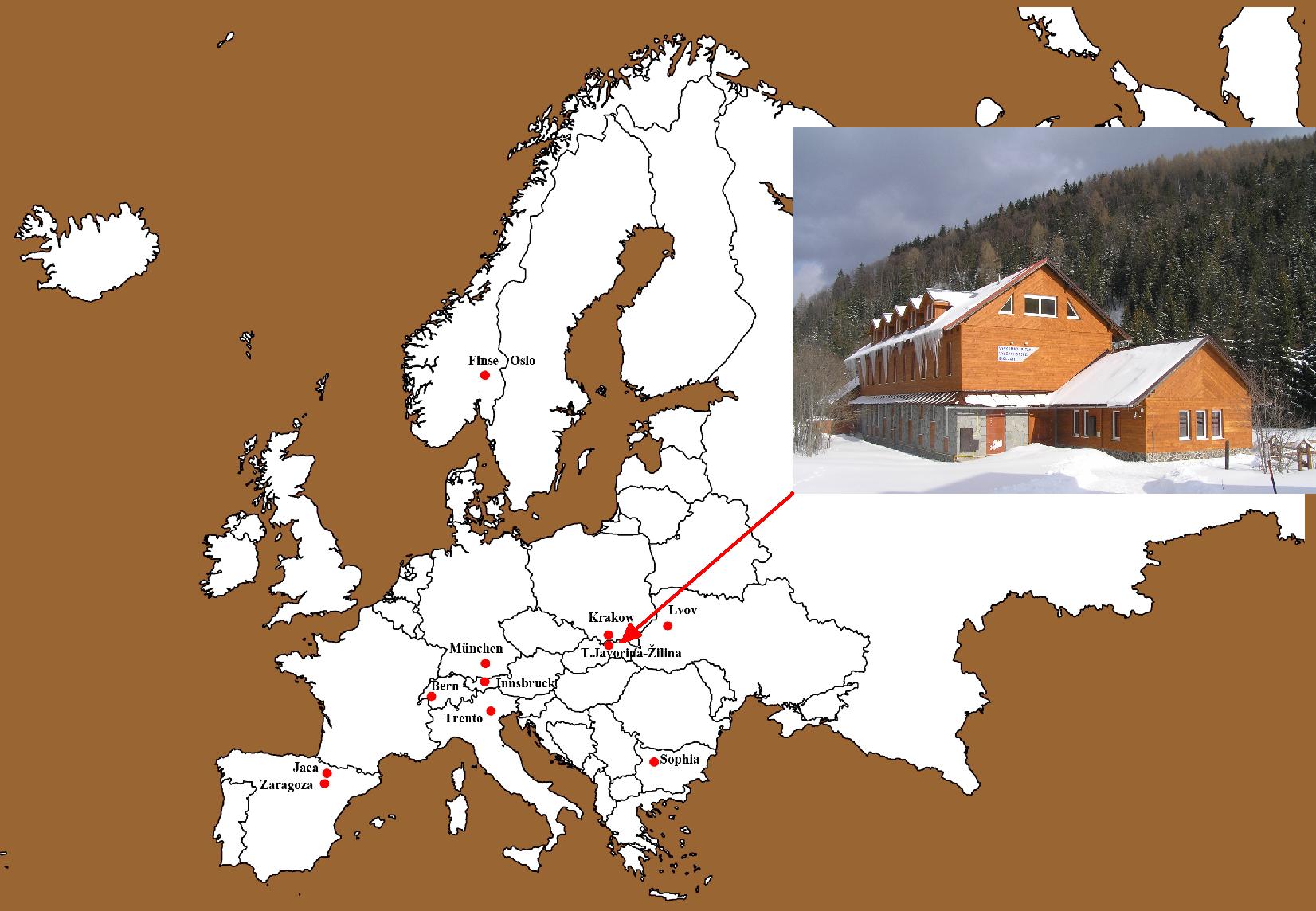About Project | Cooperation | Mountain Projects | Contact | Menu |
- Selected European Alpine Reseach Institutions ...
University Krakow
University L´viv
University Oslo - Finse Research Center
Academy of Scieces Sofia
University Munchen
University Innsbruck
University Bern
University Trento
University Zaragoza - Jaca
Forest and Range Management Research Institute - Trento
Instituto Pirenaico De Ecología - Zaragoza
Institute of Regional Research - Lviv
Bulgarian-Swiss Research Programme
The Commission for Mountain Research at the Bavarian Academy of Sciences
Institut de la Montagne - Savoie
Mountain Sustainability: Transforming Research into Practice (mountain.TRIP) EU
The European and Global Dimension of Mountain Research
Within Europe the sustainable regional development of mountain regions and their protection has become of increasing importance and therefore these are the main objectives of many transnational organisations, like the Alpine as well as the Carpathian Convention. Both Conventions are supported by the European Union and work on transnational political influence on issues concerning these mountain areas. Some of the institutions were again funded only after the Rio world summit in 1992 (see above) to bring together the mountain community on a scientific level. The following list is a completion of the above listed on European institutions and does not claim to be complete:
- As early as in 1907 the French geographer Raoul Blanchard founded the Institute of Alpine Geography (IGA) at Grenoble, and from 1913 the Revue de Géographie Alpine is the leading journal of Alpine geographical research, which in 2004 started to be a bilingual journal (French and English; http://iga.ujf-grenoble.fr).
- This may be regarded as the model for the creation of other multidisciplinary mountain institute in Italy (Imont, now: EIM: Ente Italiano della Montagna; www.eim.gov.it) and the European Academy Bolzano/Bozen (EURAC, www.eurac.org), France (Institut de la Montagne; www.institut-montagne.org), Germany (Alpenforschungsinstitut GmbH; www.alpenforschung.de) and, to a certain degree Slovenia (Anton Melik Geographical Institute AMGI: http://gi.zrc-sazu.si).
- The Mountain Research Group (MRGI) is a special interest group of the Royal Geographical Society with the Institute of British Geographers (RGS-IBG) with the objective to form a mountain community for scientists working in this field (www.cms.uhi.ac.uk/rgsmrg/).
The Mountain Research in Central Europe
Institute of High Mountain Biology, located in the small Tatra village Tatranská Javorina, is a biological research facility of the University of Žilina devoted to the advancement of study of mountain ecosystems. Its mission is to facilitate research to understand better the unique processes of biological and physical systems in mountains, and how environmental changes may affect these processes. It was established in 2000 as a center for the development of alpine biological research in the West Carpathians. Dr. M. Janiga suggested to establish the institute in 1998, as a part of a drive to create a strong research body of the North Slovakian University of Žilina. The idea was to establish the biological research centre in Slovakia that would be able to cooperate in the international alpine research projects. This was the reason why the IHMB is uniquely located near a large diversity of biological communities and landforms, and has a long legacy of environmental science programs. Research on nearby Tatra ridge has contributed substantially to our understanding of the environmental science of mountain systems.
For the first five years of its existence, the old building of previuos primary school was extensively renovated. One of the most important figures in the history of the IHMB was in the years 2009 – 2011 when the Institute had been well equipped. Part of the equipment was funded by Norvegian Financial Mechanism Research Project. Perhaps the most lasting product of the institute work have been the flourishing of Oecologia Montana as an important international journal producing knowledge on alpine and mountain biota. Currently, the Institute facilities include housing for up to 20 researchers and 20 students, conference hall,molecular ecology, zoological, and botanical laboratories.

